I posted about Eye Contact on my Facebook page the other day and garnered a few responses. It has prompted me to think a bit more about it and so I thought I might just do that thinking in the form of a post.
From the outset eye contact has always been an issue for me. There are a number of facets that make it difficult for me.
1. It causes me pain and discomfort
2. It is decidedly uncomfortable.
3. I find it extremely difficult to maintain.
4. I feel as though my every thought and feeling are laid bare to the other person
I am sure there is more to it that this but that will do for the purposes of this process. Unfortunately in modern western culture it is expected that this practice is carried out and in fact one is considered to be extremely rude if you don’t. This seems to be something that is a difficulty for many autistic people, yet there does not seem to be any way around this that is simple.
I have considered the option of just saying to people when I meet them, by the way I am an autistic adult, and I find it very difficult to maintain eye contact, so I am not being rude and it doesn’t mean I am not listening to you. I’m not sure about this option, maybe it would be helpful maybe it wouldn’t. I think for me this whole issue is symptomatic of a wider issue that centres around the idea that we need to learn to adapt and fit in, teach us social skills, run as through intensive ABA and it won’t even seem like they have autism.
One of the comments on the Facebook post was along the lines of the issue really just being a cultural norm and in other cultures it is not an issue. Whilst that may be true this doesn’t particularly help too much beyond understanding.
Moving on to practical issues. How do we adapt or get around this without compromising who we are are putting ourselves through situations that are painful, stressful and possibly meltdown leading. A very real practical situation is in the realm of securing employment. How does one negotiate the job interview; answering questions and presenting as a capable and appropriate candidate whilst trying to put yourself through a cultural practice in a situation that is by its very nature in the difficult stakes? If one looks down or away in this situation it can be interpreted as rude and disinterested and more than likely counts significantly against you.
A strategy I was offered at one point was when speaking to someone to look at their forehead. I haven’t persisted with this strategy. Perhaps I should have but it just didn’t seem to work at all. It seemed to me that I would be looking as though I was looking past them anyway.
There are just so many situations where there are expectations of eye contact that range in both the personal and professional realms that it makes it yet another hurdle for autistic people to negotiate their way through. Is this important or not?
My personal response seems to be to just avoid it and I think I tend to look down or away. I feel insecure and inferior. This is not truth of who I am or my value but it is how I tend to feel.
I would love to hear from others their experiences and strategies with dealing with this issue.






very uncomfortable for me. good post. thank you for sharing.
I think eye contact is a problem for a lot of NT people too, but it is something not always talked about. From my reading and experience, extroverts are good at keeping eye contact but introverts are not. I am an introvert and NT and find eye contact very uncomfortable (I do have an autistic son too). I get around it by looking for awhile and then looking away for awhile, and continually doing that. Most people do not maintain continual eye contact with no movement away, that is just too much. They tend to look around a bit. I also tend to look at the person’s mouth rather than eyes. Looking into someone’s eyes I feel is just too intimate, as you said. It is certainly an oppressive aspect of our culture and not needed! I never demand it of my son.
I know an ambivert (a person who is in between extroversion and introversion) who feels the same way, and feels like direct eye contact is intimate and a challenge.